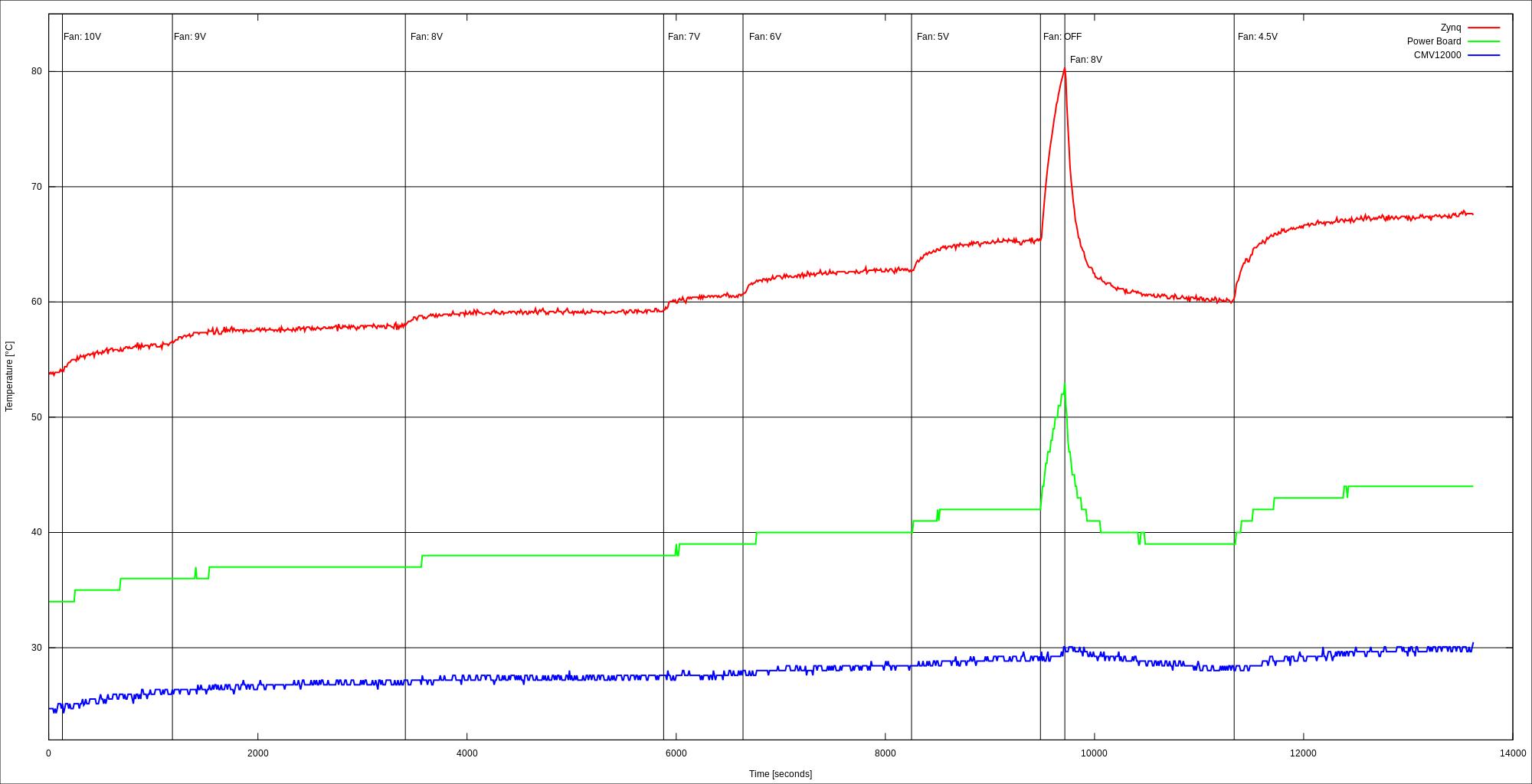AXIOM Beta/Temperatures
1 Different Temperature Sensors
The AXIOM Beta hardware contains several temperature sensors (some dedicated sensors some integrated in other chips) the different chips and components are also operating at different temperature ranges. The Zynq for example has a rather hot operation range but the image sensor is meant to be as cold as possible meaning just a few degrees above room temperature. This page is a collection of information related to reading the different temperatures throughout the hardware.
1.1 MicroZed™ Zynq 7020
The Zynq 7020 has a maximum operating temperature of 85°C and has a special heat sink attached.
The temperature can be read with the
axiom-zynq-info.sh
script (AXIOM Beta Firmware Version 2.0) which contains the following code lines:
ZTO=`cat /sys/devices/soc0/amba/*.adc/iio*/in_temp0_offset`
ZTR=`cat /sys/devices/soc0/amba/*.adc/iio*/in_temp0_raw`
ZTS=`cat /sys/devices/soc0/amba/*.adc/iio*/in_temp0_scale`
ZT=`dc -e "5k $ZTR ${ZTO/-/_} + $ZTS * 1000 / p"`
printf "%-14.14s\t%8.4f °C\n" "Temp" $ZT
Output Example (of a full axiom-zynq-info.sh):
Temp 56.5988 °C Vccint 0.9858 V Vccaux 1.7769 V Vccbram 0.9866 V Vccpint 0.9836 V Vccpaux 1.7769 V Vccoddr 1.4809 V Vrefp 0.0000 V Vrefn 0.0000 V
1.2 Power Board
The AXIOM Beta Power Board contains a dedicated LM75 digital thermometer (datasheet) which can be read with the following command:
cat /sys/class/hwmon/hwmon0/temp1_input
The output divided by 1000 is provided in °C.
The normal operation range of the Power Board goes until 60°C but should not exceed 75°C.
example output:
[root@beta] /home/operator # cat /sys/class/hwmon/hwmon0/temp1_input 44500
1.3 CMV12000 Image Sensor
The image sensor contains an integrated temperature sensor, see CMV12000 datasheet chapter 7.6.5 Temperature Sensor for reference.
This value can be read by running (AXIOM Beta Firmware Version 2.0):
axiom-cmv-reg.sh 127
The return value needs to be processed to acquire the temperature in degrees (the 𝐶𝐿𝐾_𝐼𝑁 is currently 20.833):
temperature [°C] = (RETURN_VALUE - 572.92) / 2.43
The CMV12000 is meant to operate as cool as possible as a temperature increase means visible image noise increase. In normal operation the image sensor is just a few degrees above room temperature.
1.4 Temperature Logging Script
The following bash script can be run inside the AXIOM Beta and captures Zynq, Power Board and CMV12000 temperatures every 10 seconds and logs them into a file (tab separated values) if run like:
./temperature_record.sh | tee temperature.log
Script:
#!/bin/bash
# make sure axiom-start.sh has been run before the script
# otherwise this will crash the camera when trying to read image sensor
# registers.
echo "Time Zynq Power Board Image Sensor"
while true; do
# Power Board
PBTEMPRAW=`cat /sys/class/hwmon/hwmon0/temp1_input`
# Zynq
ZTO=`cat /sys/devices/soc0/amba/*.adc/iio*/in_temp0_offset`
ZTR=`cat /sys/devices/soc0/amba/*.adc/iio*/in_temp0_raw`
ZTS=`cat /sys/devices/soc0/amba/*.adc/iio*/in_temp0_scale`
ZT=`dc -e "5k $ZTR ${ZTO/-/_} + $ZTS * 1000 / p"`
# CMV12000
CMVTEMP=`axiom-cmv-reg.sh 127`
# CLK_IN = 250/12 MHz = 20.8333
# cmv12000 offset formular:
# 825*freq/30 = 572.92
# cmv12000 slope formular:
# 3.5*freq/30 = 2.43
CMVTEMPDEC=`printf "%d" $CMVTEMP`
CMVTEMPFLOAT=`bc <<< "scale=3;($CMVTEMPDEC - 572.92) / 2.43"`
# Output
printf "%d\t%8.2f\t%8.2f\t%8.2f\n" $SECONDS $ZT $(($PBTEMPRAW/1000)) $CMVTEMPFLOAT
#repeat reading every 10 seconds
sleep 10
done
The resulting temperature.log can then be visualized with gnuplot for example:
set notitle set term svg size 2048, 1024 set multiplot set obj 1 rectangle behind from screen 0,0 to screen 1,1 set obj 1 fillstyle solid 1.0 fillcolor rgbcolor "white" set xlabel "Time [seconds]" set ylabel "Temperature [°C]" set yrange[22:85] plot 'temperature.log' using 1:2 with lines lc rgb "#FF0000" lw 2 title "Zynq", \ 'temperature.log' using 1:3 with lines lc rgb "#00FF00" lw 2 title "Power Board", \ 'temperature.log' using 1:4 with lines lc rgb "#0000FF" lw 2 title "CMV12000" unset multiplot
run with:
gnuplot temperature.plot > temperature-curve.svg
With a few additional annotations this can create a graph like:
